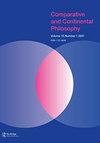Defacing Eternal Re-Coming
IF 0.3
0 PHILOSOPHY
引用次数: 0
Abstract
The first time I encountered the Rock, I tried to imagine Nietzsche’s experience and what it must have felt like to come to the rock for the first time. He tells us, of course, of the thought that changed it all for him – that everything comes again, nothing new in its re-coming to us, again and again and all in the self-same way in its timeless enfolding into itself and unfolding into the world. I viewed the Rock from as many perspectives as I could – I even viewed the rock from the lake side as much as I could manage without getting my feet too wet on this cold Lake Silvaplana day in May. On this day, I touched the rock, smelled it, and wondered about its taste. Did Nietzsche ever do these same things? I imagine he did. Is he eternally doing these things if he once did? Did he ever taste the rock out of curiosity? At least just once? I might have, but I’m keeping this a secret and will accept and affirm a life that pronounces the taste comes back to me, time and time again, eternally re-coming. I also sat on the rock, leaned back on it, and tried to enter the stone as Isamu Noguchi once said to his assistant, but this time, in my time, without a hammer or chisel. I wanted to get into the rock’s silence and just be in its world, just like the Rock of Eternal Re-coming. I spoke to the rock, as if it could listen, and it only replied to me in its silence amidst the heightening sounds of the winds moving clouds over and through the peaks of the vertical mountains around Silvaplana. The clouds came to us too on our portion of the land that surrounds Silvaplana Lake. As I listened to the monolithic rock’s silence, I saw more clearly the syntax of its utterances of silence coming again, and again – eternally – until they were silently audible. What feeling had possessed Nietzsche when the thought came to him? Did he spontaneously disperse as the cloud of his self converged with the peak of this pyramidal rock that positioned itself between land and lake? Did he diffuse floating over the lake’s water and swirl upward to the monumental peaks of the surrounding alpine mountains in the Engadin? I tried to channel the nearsighted philosopher and retraced my steps as I came upon the rock down the pathway, from the direction he must have come from his rental lodging with the Durisch family in Sils Maria Village. Is this the spot where he saw the rock first when he turned the corner that I was now turning? With his poor vision, it is unlikely he saw it from the distance as we did when we approached. My guess is that he was just walking and waiting for the thoughts to come with his notebook in his jacket pocket to jot down his insights. And then, the Rock came into his view, as it re-came into mine, once again. What this Rock meant to Nietzsche was everything; for him, everything crystalized in this pyramid-shaped rock that embedded its base in the earth and with its peak reaching for the sky. Although Nietzsche never read Levy-Bruhl, I think he would have appreciated his idea of primitive participation that was reinstated in this rock’s language. In its fractal congruence, the Rock resonates with the surrounding peaks of the Engadin – for it displays a self-similarity of all that is becoming in its world; all that is world. I thought about this again at the Rock and蔑视永恒的再次降临
当我第一次遇到岩石时,我试图想象尼采的经历,以及第一次来到岩石的感觉。当然,他告诉我们改变了他一切的想法——一切都会再次出现,对我们来说没有什么新的东西,一次又一次,一切都是以自我的方式永恒地融入自己,向世界展开。我从尽可能多的角度观察这块岩石——在五月这个寒冷的西尔瓦普拉那湖的日子里,我甚至尽可能多地从湖边观察这块岩石,而不会把脚弄湿。在这一天,我触摸了这块岩石,闻了闻,想知道它的味道。尼采做过同样的事吗?我想他做到了。如果他曾经做过,他会永远做这些事情吗?他有没有出于好奇品尝过这块石头?至少一次?我可能会这样做,但我对此保密,我会接受并肯定一种生活,这种生活一次又一次地让我想起这种味道,永远重现。我也坐在岩石上,向后靠,试图进入石头,就像野口勇曾经对他的助手说的那样,但这一次,在我的时代,没有锤子或凿子。我想进入岩石的沉默,置身于它的世界,就像永恒的重临之石。我对着岩石说话,好像它能听一样,它只是在风吹过西尔瓦普拉纳周围垂直山脉山峰的声音中沉默地回答我。在西尔瓦普拉纳湖周围的那片土地上,云层也向我们袭来。当我听着巨石的沉默时,我更清楚地看到了它的沉默话语的句法,一次又一次——永远——直到它们被无声地听到。当尼采想到这个想法时,他有什么感觉?当他自己的云与这块位于陆地和湖泊之间的金字塔形岩石的顶峰汇合时,他是否自发地散开了?他是不是漂浮在湖面上,盘旋向上,到达恩加丁周围高山的雄伟山峰?我试着引导这位近视的哲学家,当我沿着小路走到岩石上时,我沿着他一定是从Sils Maria村Durisch一家租住的地方来的方向往回走。这是他转弯时第一次看到岩石的地方吗?我现在正在转弯?由于他的视力很差,他不太可能像我们走近时那样从远处看到它。我的猜测是,他只是在走路,等待着想法的到来,夹克口袋里放着笔记本,记下他的见解。然后,岩石再次出现在我的视野中,进入了他的视野。这块石头对尼采来说意味着一切;对他来说,一切都在这个金字塔形的岩石中结晶,它的底部嵌入地球,顶峰伸向天空。尽管尼采从未读过莱维·布鲁尔的书,但我想他会欣赏他在这块岩石的语言中恢复的原始参与的想法。在其分形一致性中,岩石与恩加丁山脉周围的山峰产生了共鸣——因为它表现出了世界上所有事物的自相似性;这就是世界。我在the Rock和
本文章由计算机程序翻译,如有差异,请以英文原文为准。
求助全文
约1分钟内获得全文
求助全文

 求助内容:
求助内容: 应助结果提醒方式:
应助结果提醒方式:


